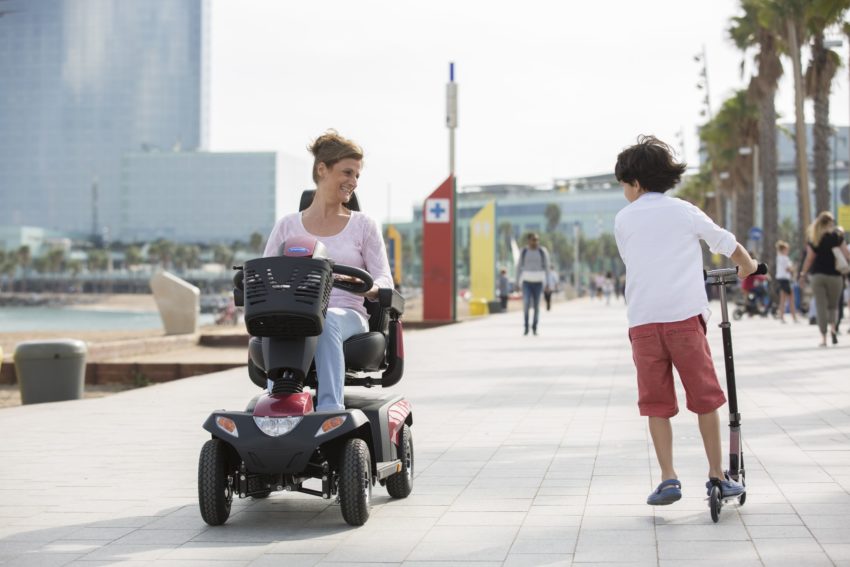Mobility Scooter Insurance – What Others Won’t Tell You

If you’re thinking about buying a mobility scooter, a few questions have popped-up in your head, no doubt. We have probably already answered quite a few of them in previous articles, but this time we’ll tackle one that’s really overlooked: mobility scooter insurance.
I don’t know if it’s just me, but mobility scooters are, it seems, gaining on popularity by the day. No wonder – their practicality and affordability make them an ideal mobility solution to an ever-increasing number of people. Part of the reason for this lies in legislation which has left a gap, an unfilled niche between people’s needs and the options offered by health services – and this is true for many parts of the world.
For example, in the United States, Medicare won’t approve a power wheelchair for persons who don’t need to use the chair, as they say, “inside their own home”, even if their mobility restricts the use of a mobility scooter. Such regulations also exist in some Canadian provinces and in the UK, with manual wheelchairs prescribed for persons with any ability to walk. This has led to many people, who might be better served by a powerchair, privately getting a mobility scooter as a more affordable and practical alternative.
Now, with so many mobility scooters buzzing around our streets, and since they aren’t usually provided by health services, you are probably – and rightly so – wondering if mobility scooters are an aid in the traditional sense at all.
A legal introduction, of sorts
Well, yes. And no. In the UK, for legal purposes mobility scooters are classified by the Use of Invalid Carriages on Highways Regulations 1988 as either Class II or Class III Invalid Carriages. A Class II mobility scooter must be limited to 4 mph (6.4 km/h) for use on a footway only, while a Class III scooter must be limited to 8 mph (13 km/h) for road/highway use and have an additional 4 mph limiter for footway use. To be road safe in both the UK and EU, due to the difference in maximum legal speed (8 mph for UK and 16 mph for EU), some mobility scooters come with a speed limiter switch.
As of March 2010, a consultation is under way to determine how the law should adapt to increasing scooter use. Due to concerns over safety issues and problems with bringing prosecutions against irresponsible users under existing laws, the consultation will, among other things, consider whether to make third party insurance mandatory, consider the introduction of compulsory training for users and discuss how to bring scooter users under wider road traffic legislation.
This somewhat lengthy introduction wasn’t really an introduction. It did, however, bring us to our main point, which is mobility scooter insurance. It also, hopefully, made you think about why you probably should consider getting an insurance plan for your mobility scooter. Because it’s not just an aid – it’s a proper vehicle.
Do I need to insure my mobility scooter?
Although, as we mentioned before, mandatory mobility scooter insurance is being considered for the future, as of writing of this article, you do not need insurance for a mobility scooter, it is not required by the law. But, as we mentioned before, it is advisable. After all, you’d insure your car even if you didn’t have to, right? So, if you’re privately purchasing or leasing your mobility scooter, insurance may be something worth considering for peace of mind. And it’s not just about the risk of you knocking into another person or damaging property – like any other vehicle, a mobility scooter can suffer a breakdown regardless of how well it has been serviced.
What does mobility scooter insurance cover?
Ultimately, this will depend on each individual company’s policy and your needs, but mobility scooter insurance may include anything from breakdown recovery service, theft, accidental damage, vandalism, third party liability cover, all the way to personal accident, replacement scooter hire, and cover for lost or damaged keys. Many providers also include services such as roadside assistance, recovery, taxi home, and home rescue, should your mobility scooter break down at home.
As with all things legal, there are many things to be mindful of. Here’s a handy list of a few of them:
- the number of times that you’re allowed to call out recovery service will depend on the company’s policy, and some companies will cancel your policy – without refund – if you exceed the number of calls allowed;
- keep in mind that most policies will only cover you for the mobility scooter that you registered at the start of the policy, so let the company know immediately if you change mobility scooters.
Items that may not be covered, among other things, include:
- any claim within 24 or 48 hours of the policy being taken out;
- claims that exceed £250;
- a breakdown outside an area of 20 miles of your home address.
In conclusion, keep in mind that this guide is just an introduction. You should probably get mobility scooter insurance even if you don’t use your mobility scooter a lot, but you should definitely choose your insurance provider with due diligence. Familiarise yourself with all the options and make no hasty decisions.
Remember, mobility scooter is much more than just an aid.







